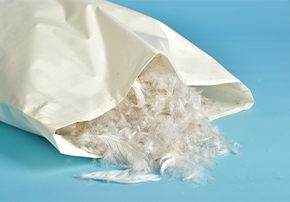Pillows For Allergies


Pillows for Allergies
Hypoallergenic Options for a Healthy Sleep Environment
A good night's sleep is vital for our overall health and well-being. If you suffer from allergies, you’ll understand the importance of an allergy-free pillow for a good night’s sleep. Hypoallergenic pillows are essential for a healthy sleep environment. Now that we understand how vital good sleep is for our overall health, finding the best anti-allergy pillow is a priority for many seeking to live a happier, healthier life.
Allergies can wreak havoc on our sleep quality, leaving us feeling groggy and exhausted. That's where hypoallergenic pillows come to the rescue. In this article, we'll explore the world of hypoallergenic pillows and their remarkable benefits. Say goodbye to sleepless nights filled with sneezing and discomfort. Discover the best pillows for allergies and create a healthy sleep environment that promotes uninterrupted slumber and revitalizing rest.
Benefits of Hypoallergenic Pillows
Hypoallergenic pillows are specifically designed to combat allergens and provide a healthier sleep environment. By investing in hypoallergenic pillows, you can say goodbye to those troublesome allergy symptoms and embrace a truly restful night's sleep.
Common allergens found in pillows can vary depending on the materials used in their construction.
Allergens that tend to affect people, commonly include
- Dust mites: microscopic organisms that are a common cause of allergies and can thrive in pillows, feeding on dead skin cells. Their droppings contain allergenic proteins that can trigger allergic reactions.
- Feather pillows cause allergies in individuals sensitive to these materials. The feathers can release fine particles or dander that may trigger allergic symptoms.
- Synthetic pillows, particularly those made of polyester or other synthetic fibres, can sometimes cause allergic reactions. Some people may have sensitivities to the chemicals or additives used in the manufacturing process.
- Pillows exposed to moisture or high humidity: These pillows can become a breeding ground for mould and mildew. These fungi produce spores that can trigger allergies and respiratory issues.
- Latex pillows can cause allergies in individuals sensitive to latex. The proteins in latex can lead to allergic reactions, including skin irritation or respiratory problems.
- Pillows treated with fragrances or dyes: Which can potentially cause allergic reactions in individuals with sensitivities to these substances.
Key Features of Hypoallergenic Pillows
If you struggle with sensitivities or allergies to any of these common allergens, it’s essential to consider choosing an anti-allergy or hypoallergenic pillow to sleep on to significantly reduce allergic reactions and potentially stop them completely. When choosing an anti-allergy pillow make sure to consider these factors.
- Materials – Most hypoallergenic pillows are made from materials like organic cotton, or bamboo-derived fibres.
- Dust Mite Resistance – Choose a pillow that is made to be dust mite resistant, preventing the build-up of these allergens and mites.
- Breathability – Choose a pillow made from breathable material that offers moisture-wicking properties to ensure a cool and dry sleep environment.
Best Pillows for Allergy Sufferers
When it comes to pillows for allergies, there are two main material types that we recommend at Dial-a-Bed. Memory Foam pillows and Microfibre pillows offer the best benefits to allergy sufferers in terms of materials, construction, and customer satisfaction. Here’s why:
#1 Memory Foam Pillows
- Memory foam pillows are typically made from polyurethane foam, a synthetic material that is inherently hypoallergenic.
- Memory foam pillows have a dense structure with tightly packed fibres, making it difficult for dust mites to penetrate and thrive within the material. This can help reduce the risk of dust mite allergies.
- Memory foam is naturally resistant to mould and mildew growth because it is made from a solid piece of foam without any open spaces for moisture to accumulate.
Unlike pillows filled with feathers or down, memory foam pillows do not shed feathers or dander that can trigger allergic reactions. The solid foam construction minimizes the release of particles into the air, reducing the potential for allergic responses. Many memory foam pillows come with removable and washable covers, allowing you to regularly remove and wash the cover to eliminate allergens. Allergy sufferers often experience discomfort during sleep due to congestion or respiratory issues. Memory foam pillows conform to the shape of your head and neck, providing adequate support and alignment. This can help alleviate discomfort and promote better breathing.
#2 Microfibre Pillows
Microfibre pillows are typically made from synthetic fibres, such as polyester or nylon, which are naturally hypoallergenic.
- Microfibre pillows have a tightly woven construction, making it difficult for dust mites to penetrate the fabric and thrive inside.
- Microfibre materials are also generally resistant to mould and mildew growth.
- Microfibre pillows do not shed fibres or dander as feathers or down pillows might.
- Microfibre pillows are often machine washable, making them easy to clean and maintain.
- Microfibre pillows often have a soft and plush feel, providing comfort and support for the head and neck. This can help allergy sufferers achieve a night of more restful sleep and alleviate discomfort caused by congestion or respiratory issues.
Factors to Consider When Choosing an Anti-Allergy Pillow
When it comes to choosing the perfect anti-allergy pillow for your unique needs, there are several important factors to consider:
- What are your personal preferences when it comes to the firmness of the pillow?
- Do you prefer a soft pillow or an ultra firm pillow? Or do you prefer something in between?
- What size and shape of pillow do you like to sleep on?
- Do you have additional requirements for a pillow, like an adjustable loft or a contoured design?
- What is your budget for investing in a hypoallergenic pillow?
Where to Find Anti-Allergy Pillows
When it comes to a bedding retailer that offers a variety of pillows and other accessories too, choose Dial-a-Bed. We offer a unique online shopping experience as well as a range of 76 stores that offer personalized advice and guidance for finding the perfect anti-allergy pillow. Browse through our range of pillows and pillow protectors now to find your ideal fit. By investing in hypoallergenic pillows, you can bid farewell to those sleepless nights filled with sneezing and discomfort. For a range of the most comfortable beds each designed with the latest in sleep technology, and engineered to suit your unique sleep-style, shop online with Dial-a-Bed. Visit one of 76 Dial-a-Bed stores nationwide. Find your nearest store





